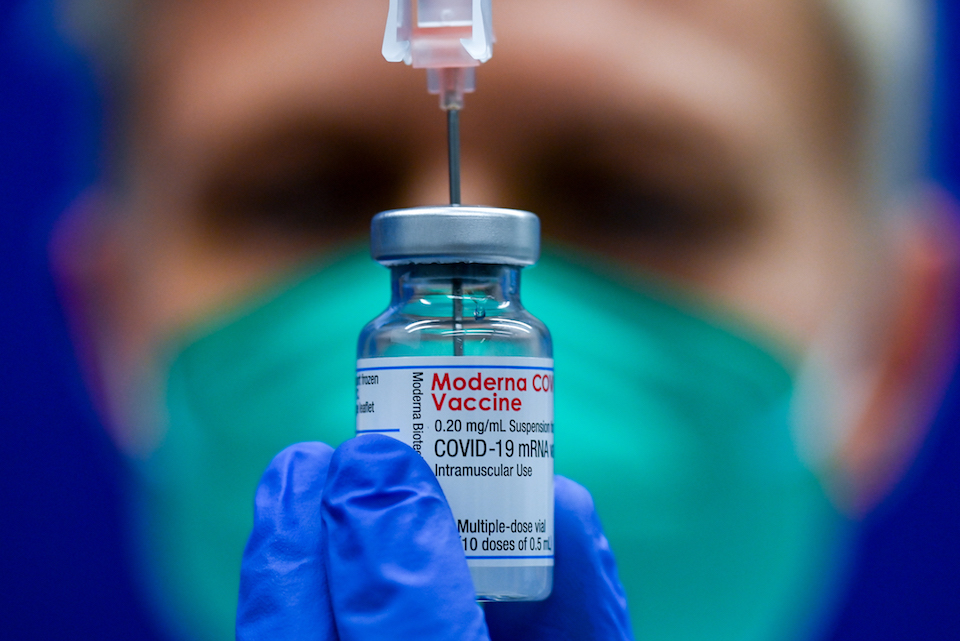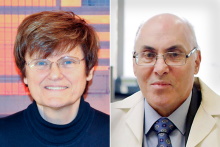Rosenstiel Award winners celebrated for life-saving scientific breakthroughs
At this year's award ceremony, Katalin Karikó and Drew Weissman were recognized for doing much of the research that led to two COVID-19 vaccines.

The year’s awards ceremony for the Lewis S. Rosenstiel Award for Distinguished Work in Basic Medical Research honored two scientists whose research has saved countless lives.
The winners, Katalin Karikó and Drew Weissman '81, MA'81, P'15, pioneered much of the science underlying the COVID-19 vaccines developed by Pfizer/BioNTech and Moderna now being administered across the globe.
The winners, Katalin Karikó and Drew Weissman '81, MA'81, P'15, pioneered much of the science underlying the COVID-19 vaccines developed by Pfizer/BioNTech and Moderna now being administered across the globe.
As Brandeis President Ron Liebowitz put it in his closing remarks at the Feb. 8 event, "We speak on behalf of humanity and millions of people thanking you for your incredible scientific discovery."

Courtesy Karikó/University of Pennsylvania
Katalin Karikó and Drew Weissman
Both the Pfizer/BioNTech and Moderna vaccines rely on the groundbreaking work Karikó and Weissman did over the 20 years at the University of Pennsylvania on messenger RNA, a vital component of the protein-production process inside cells.
The vaccines were developed in record time – under a year – and have an unprecedented 95% efficacy rate.
The vaccines were developed in record time – under a year – and have an unprecedented 95% efficacy rate.
"The research of our two winners tonight offers hope – and proof – that science holds the power to rescue us from calamity," Liebowitz said.
Karikó is now a senior vice president at BioNTech RNA Pharmaceuticals and Weissman is a professor of medicine and director of vaccine research in the division of infectious diseases at the Perelman School of Medicine at the University of Pennsylvania.
This year was the 50th anniversary of the Rosenstiel Award, which was founded to recognize basic science researchers who have transformed the field of medicine.
The presentation of the award was conducted via Zoom and watched by roughly 1,500 people around the world.
It featured two other major players in the development of COVID-19 vaccines, Derrick Rossi, who co-founded Moderna in 2010, and Anthony Fauci, the director of the National Institute of Allergy and Infectious Diseases.
Fauci, in whose lab Weissman worked as a research fellow during the 1990s, pointed out that it took roughly two decades for Karikó and Weissman's research to travel from bench to bedside. He said that showed how investing in basic science research ultimately pays off.
"Forecasting the ultimate value of basic research can be difficult," he said. "However, fundamental advances in basic research can underpin extraordinary progress in real-world medicine."
Karikó is now a senior vice president at BioNTech RNA Pharmaceuticals and Weissman is a professor of medicine and director of vaccine research in the division of infectious diseases at the Perelman School of Medicine at the University of Pennsylvania.
This year was the 50th anniversary of the Rosenstiel Award, which was founded to recognize basic science researchers who have transformed the field of medicine.
The presentation of the award was conducted via Zoom and watched by roughly 1,500 people around the world.
It featured two other major players in the development of COVID-19 vaccines, Derrick Rossi, who co-founded Moderna in 2010, and Anthony Fauci, the director of the National Institute of Allergy and Infectious Diseases.
Fauci, in whose lab Weissman worked as a research fellow during the 1990s, pointed out that it took roughly two decades for Karikó and Weissman's research to travel from bench to bedside. He said that showed how investing in basic science research ultimately pays off.
"Forecasting the ultimate value of basic research can be difficult," he said. "However, fundamental advances in basic research can underpin extraordinary progress in real-world medicine."
Karikó and Weissman began researching messenger RNA (mRNA) soon after they met at U Penn in the late 1990s.
Through a process called transcription, DNA builds mRNA, imprinting it with instructions for creating proteins. The mRNA then transports the instructions from the nucleus to the cell's ribosomes, which are where proteins are manufactured.
"DNA makes RNA makes protein makes life," is how Rossi explained it.
Given mRNA's critical role in the process – what Rossi called "the trifecta of life” – he wondered why it took more than 30 years after mRNA's discovery before scientists began to explore the molecule's potential as the basis for a therapeutic.
During this time, the other two components of the trifecta — DNA and proteins — were thoroughly investigated for their use in medical treatments.
"What's remarkable is that although all biologists know what mRNA is and what it does, surprisingly few actually used it," he said.
He attributed the neglect to an obstacle scientists couldn't figure out how to overcome. When mRNA was inserted into a cell, it stimulated an immune system reaction that caused cell death.
But in 2005, Karikó and Weissman reported they'd solved this problem. They'd found a way to disarm mRNA so it could sneak past the cell's defense systems.
Once inside the cell, the mRNA triggers the production of a specific protein linked to whatever disease you're trying to vaccinate against. This causes the production of antibodies that effectively inoculate the person from future infection.
Rossi, currently CEO of Convelo Therapeutics in Cleveland, predicted mRNA will be the basis for vaccines for a raft of other diseases, including Zika, influenza, cancer and others. He said mRNA may even prove useful in combating a large number of the 6,000 human genetic diseases.
"Only now are people starting to come to grips with what [mRNA] does and what utility it can serve for our health," Rossi said. "For this global insight, we have many to thank but chief among those are Drs. Karikó and Weissman."
"Who would have guessed that it would have taken a global pandemic of devastating magnitude for one of the pillars of life, mRNA, to be introduced to us all," he added.
In his opening remarks at the ceremony, James Haber, the Abraham and Etta Goodman Professor of Biology and director of the Rosenstiel Basic Medical Sciences Research Center, pointed out that the Rosenstiel Award may be just the beginning of accolades for Karikó and Weissman.
Thirty-six of 93 Rosenstiel Award winners have subsequently been awarded the Nobel Prize in Medicine or Physiology or in Chemistry. On average, Haber said, it takes nine years after winning the Rosenstiel Award to earn the Nobel.
"We are not interested simply in predicting Nobel Prizes," Haber said, "but in recognizing people whose work has really been of fundamental importance."
A broadcast of the ceremony can be found here.
Categories: Research, Science and Technology





